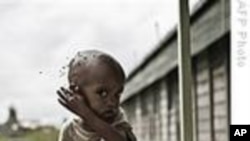<!-- IMAGE -->The United States is committed to helping people in need all over the world, and it takes this mission very seriously. With billions of dollars spent on humanitarian, economic and other forms of assistance every year, the U.S. wants to be sure that the aid is properly and effectively distributed. So it is that U.S. officials are concerned about recent reports that the Ethiopian government may be politicizing humanitarian assistance ahead of next year's national elections.
Amid wide-spread food shortages caused by a long-running drought across much of East Africa, Ethiopia receives considerable aid from the U.S. and other nations. It is estimated that more than 6 million of the country's 80 million people rely on aid to survive, with another 7 million relying heavily on on the Productive Safety Net Program, a food-for-work program administered by the government and supported by foreign assistance.
A spokesman for the major opposition political coalition, the Forum for Democratic Dialogue, recently complained that the government was allowing only ruling party members to take part in the Productive Safety Net Program. To eat, he said, desperate people are forced to join the ruling party. A top government spokesman, however, flatly denies the charge.
Though unproven, the allegations echo a similar charge by the opposition that in 2005 officials in Oromiya denied food aid from international donors to residents of some communities that had voted for opposition candidates in elections that year.
The U.S. Government is aware of the recent complaints. All U.S. government humanitarian assistance agencies have monitoring systems in place to prevent or expose such activity which we are continually reviewing and working to improve. Discussions are also taking place with nongovernmental partners to ensure full compliance with the U.S. strict monitoring standards. USAID personnel in Ethiopia are increasing field visits to observe distribution dynamics with specific attention to these allegations.
The U.S. is committed to the people of Ethiopia and ensuring that its humanitarian aid does reach those most in need.
Amid wide-spread food shortages caused by a long-running drought across much of East Africa, Ethiopia receives considerable aid from the U.S. and other nations. It is estimated that more than 6 million of the country's 80 million people rely on aid to survive, with another 7 million relying heavily on on the Productive Safety Net Program, a food-for-work program administered by the government and supported by foreign assistance.
A spokesman for the major opposition political coalition, the Forum for Democratic Dialogue, recently complained that the government was allowing only ruling party members to take part in the Productive Safety Net Program. To eat, he said, desperate people are forced to join the ruling party. A top government spokesman, however, flatly denies the charge.
Though unproven, the allegations echo a similar charge by the opposition that in 2005 officials in Oromiya denied food aid from international donors to residents of some communities that had voted for opposition candidates in elections that year.
The U.S. Government is aware of the recent complaints. All U.S. government humanitarian assistance agencies have monitoring systems in place to prevent or expose such activity which we are continually reviewing and working to improve. Discussions are also taking place with nongovernmental partners to ensure full compliance with the U.S. strict monitoring standards. USAID personnel in Ethiopia are increasing field visits to observe distribution dynamics with specific attention to these allegations.
The U.S. is committed to the people of Ethiopia and ensuring that its humanitarian aid does reach those most in need.













